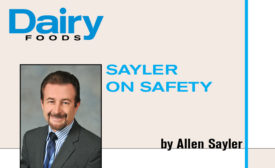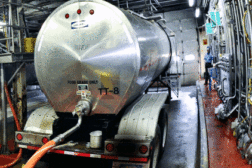Home » Food Safety Modernization Act
Articles Tagged with ''Food Safety Modernization Act ''
Under FSMA, dairies need to identify hazards that require a preventive control, including an analysis to verify the safety of ingredients.
Read More
These keys can open the doors to FSMA’s kingdom
Some free training material is helpful yet confusing. So you will need to do additional editing and fine-tuning to create documents that comply with regulatory requirements.
January 10, 2017
Food safety
5 dairy processors commit to dairy traceability best practices
The dairy industry sets an ambitious 80% commitment goal by next year. A dairy processor can implement the practices with paper and pencil in just a few minutes a day.
September 12, 2013
Federal regs
FDA says: Speak up now on proposed food-safety rules
The agency extends the public comment period 60 days for proposed rules on preventive controls for human food, produce safety.
August 8, 2013
Regulations
Processors still unsure of FSMA implications
A new survey by iRely shows that most companies are still unaware of how the changes will affect them
May 8, 2013
Defending dairy plants
Food defense is way beyond food safety. Search the FDA’s mitigation strategies database for ideas how to improve security around a blend tank, pasteurizer or other equipment.
April 17, 2013
Rules and regs
FDA seeks comments on Listeriosis draft; FSMA rules
The Listeriosis risk assessment is a joint effort between FDA and Health Canada. FDA seeks FSMA comments at meetings in Illinois, Oregon.
February 12, 2013
Food safety
Dairy Foods columnist Allen Sayler leads HACCP, FSMA seminars
The workshops are in Rosemont, Ill., at Dairy Management Inc.
October 29, 2012
Food safety
FDA's updated food facility registration system is available Monday Oct. 22
Facilities can register online, via mail or fax. FDA encourages online registration.
October 20, 2012
Stay ahead of the curve. Unlock a dose of cutting-edge insights.
Receive our premium content directly to your inbox.
SIGN-UP TODAYCopyright ©2025. All Rights Reserved BNP Media.
Design, CMS, Hosting & Web Development :: ePublishing









